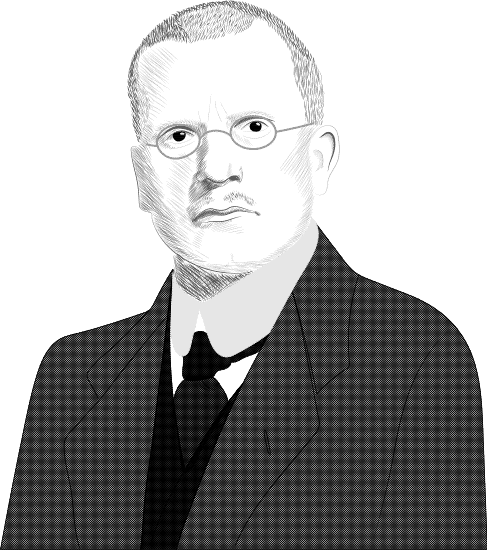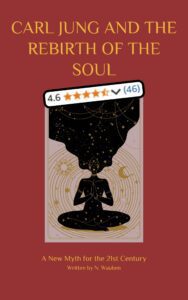Table of Contents
About this Series
Hello everyone in this series I attempt to make an in-depth analysis of The Red Book written by Carl Jung. I believe that only a thin line separates insanity from genius, and I believe that this book is a great example. I will discuss several parts of The Red Book to find out whether this might be the craziest book ever written.
Introduction
Carl Jung – The Red Book; the craziest book ever written? Many will agree that The Red Book is perhaps the most unique book ever written. Reading The Red Book is quite an intense experience and some parts are so powerful that they might literally blow you away.
The background to The Red Book is a unique story on its own. Even though The Red Book is now considered to be one of Carl Jungs’ most important works, it was not accessible to the general public until 2009. The edition that I read, “Reader’s Edition” , dates from 2012 and is more accessible to the general reader than the 2009 edition because of its size and price, it can be found here on Amazon: https://amzn.to/3pglacO. Adding to the mystery, it has been argued by a few critics that Carl Jung was having a psychosis during the time that he was writing The Red Book. Besides the background, how does the content make The Red Book so unique?
What is The Red Book all about?
In The Red Book Carl Jung is going on a unique adventure. He is not travelling to a different country or going to climb a mountain, instead he is going on an adventure within his own soul. He confronts his unconscious and from the insights that he finds he destroys and recreates his own life. It is argued that he found the insights that would later be the most important pillars of his work while exploring the depths of his unconscious.
Follow your own path
Jung believed that, despite the risks involved, many people would benefit from a similar journey into the depths of his or her own soul. It is, however, important to note that Jung did not intend for anyone to copy his journey, instead he encouraged everyone to follow their own path: “My path is not your path, therefore I / cannot teach you. The way is within us, but not in Gods, nor in teachings, nor in laws. Within us is the way, the truth, and the life.” (p.125) As you can see from this quote Jung did not only warn against following the example of others, but also against the temptation of ‘finding your way’ in Gods and ideologies.

Finding your soul (the time and depth spirit)
In The Red Book Jung attempts to reconnect with his soul. It is not easy to explain what the soul exactly is, and I believe Jung did not really try to explain this either because it differs from person to person and because, as will now be discussed, the soul cannot be identified as an object: “I thought and spoke much of the soul. I knew and learned words for her, I had judged her and turned her into a scientific object. I did not consider that my soul cannot be the object of my judgement and knowledge; much more are my judgement and knowledge the objects of my soul.”(p.128)
This is where it gets complicated and some might argue even a bit crazy. I will do my best to explain Jung’s ideas as clearly as possible.
According to Jung there are two ‘dimensions’: (1) The spirit of the times and (2) the spirit of the depths. The spirit of the times can be explained as the dimension in which we live. We go to school, we go to work, we follow the law, and we think we know who we are and what we want. The spirit of the time is always changing its form and it is in no way constant. The world changes, you yourself change, laws come into being and disappear again, wars are fought, values change, and time goes on. In this dimension everything that happens can be explained easily, everything can be rationalized.
The spirit of the depths, on the other hand, is eternal and everlasting, it does not change, it encompasses all that has ever happened and all that will ever happen, it does not attach value, it does not judge or objectify: “From this we learn how the spirit of the depths considers the soul: he sees her as a living and self-existing being, and with this he contradicts the spirit of this time for whom the soul is a thing dependent on man, which lets herself be judged and arranged and whose circumference we can grasp.” (p.129)
It took me a long time to grasp this idea and it still makes my head spin a little. However, I do believe I understand at least to some degree what this means in the context of finding your soul. Please correct me if I am wrong. If you want to find your soul, you should dig very deep, you should not just consider your own life in this time but everything that has ever happened before, you should not try to judge or objectify your soul, you should not consider it in terms of good or bad. You should not even think that you are equal to your soul or that you can control you soul; “I had to speak to my soul as to something far off and unknow, which did not exist through me, but through whome I existed.” (p.129)
In this sense it might be argued that your soul has always existed and will always exist. The only thing that may change is your awareness of your soul. You can find your soul by looking inwards, here Jung and the Buddhists appear to agree: “He whose desire turns away from outer things, reaches the place of the soul. If he does not find the soul, the horror of emptiness will overcome him, and fear will drive him with a whip lashing time and again in a desperate endeavour and a blind desire for the hollow things of the world.” (Ibid)
According to Jung you can never find your soul in external things “He becomes a foul through his endless desire, and forgets the way of his soul, never to find her again. He will run after all things, and will seize hold of them, but he will not find his soul, since he would find her only in himself” (Ibid). As such, if you a trying to find your soul, you should look inwards, you should try not to judge or objectify what you find, you should not try to label it. It appears Jung argued that you should interact with your soul and let your soul interact with you as if you were interacting with another person “the spirit of the depths forced me to speak to my soul to call upon her as a living and self-existing being.” (Ibid)
Conclusion to part 1
Alright, I hope you are still with me and have not yet abandoned your soul by ‘running after all things’. As you can see from this part it would not be a strange reaction to label The Red Book as the craziest book ever written. However, I mean this in a positive way, it is up to you how you interpret crazy in this context.
For this first part we have only analysed around 10 pages of The Red Book (page 119 to 129 of the readers edition). As you may have noticed these pages were already filled with many unique insights. Finding your soul is not necessarily an extremely easy endeavour. You might have to let go of all your preconceived thoughts of what your soul is since they might be a part of the spirit of this time, you must recognize that your soul is not a part of you, but you are a part of your soul. We have learned that you must look inward to find your soul if you do not do this and put too much value on external things you may never find your soul. As we will see in the next parts Jung argued that this will have some serious implications. Lastly, we have seen that Jung argued that you should not interact with your soul as if it were an object, but you should see your soul as a being living independently on its own.
Thank you for reading. Hope to see you in part 2!

